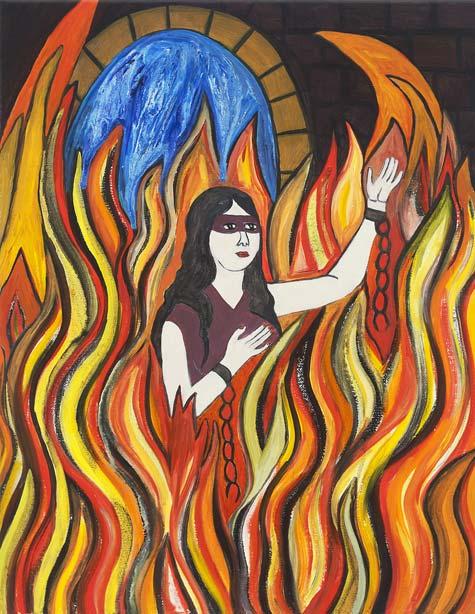To say I am not sad is to say I am a monster.
*
And in this world is a village of women
whose houses are full and fragrant They grieve
in private and carry a sack of ashes to their graves
*
Twice a year I have the privilege of choosing poems for the online feminist quarterly, On The Issues Magazine. Each issue has a theme, to which the poems should also adhere, at least in the way that poems do, which is to say, in all sorts of ways.

Susan Bee artwork, via On The Issues Magazine.
And then I wondered why I thought that the poems needed to carry it all, when they’d be surrounded by insightful essays and analyses by some of the sharpest thinkers on this issue we have.
Oh me of little faith. I put out the word and the poems that came in response do it all.
In “Women’s Liberation, 1971,” Judith Arcana brings us right into the underground circle of activists who counseled women needing abortions before the 1973 Roe v. Wade decision legalizing them: The next card is/Terrelle, who’s thirty-two and angry. Her/doctor gave her an IUD that didn’t work;/he says there’s nothing he can do/…they lived far away, had no one but us,/no one to tell, no one to help, no money.
The language is simple, the story less so: true stories of scared women, angry women, hurting women. And of the determined women who quietly helped them when no one else would.
Sonya Renee Taylor speaks from the other side of the equation, from the experience of having an abortion. Her piece, “Why We Held Our Tongues,” is a manifesto to sever the stitch of shame. First she names the names that others give to women who’ve made the decision to end their pregnancies: monsters, liars (if they say they are not sad), lepers, heartless as tile.
Then, with a propulsive rhythm that does not quit, the piece takes us through the abortion itself and out the other side, celebrating the decision, the choice, not as a regret, not as a shame, but as the exact right thing:
To say, the doctor’s face was a blur of soft cotton,
his voice a crisp steel speculum is to free the pigeon of truth
from its cage so it might return dove. To say,
in the recovery room I smelled twenty shades of crimson escape
fleeing down all the women’s thighs is to say, I am seer and historian,
conqueror and scared teenage girl 13 credits shy of statistic.
To say, I have never spent $350 dollars more wisely
Johnna Schmidt’s “Red Rover” reminds us that abortion rights can be about the question of not whether, but when, to have children, as the speaker laments the mess of her life when she was pregnant at 25. How then later, motherhood bounces back,/catches me in its shining snare.
Poetry dwells in contradiction and complexity, too. Melissa Tuckey’s poem, “Abortion,” resides at the nexus of gratitude and sorrow:
And somewhere in this world is a village of women
who wear only black They confess their joy
in private and carry a sack of ashes to their graves
Finally, the poems came full circle, as they came to my inbox. Katherine Anderson Howell, who works as a clinic defense volunteer outside a Planned Parenthood clinic, shows us in her poem, “Things to Know When Walking to the Abortion Clinic,” that abortion rights are still under attack, 40 years after Judith Arcana’s women gathered in clandestine solidarity.
Thanks to the speaker in Howell’s poem, however, and to so many other activists, health care workers, and volunteers – female and male – the clinic is still open.
Sarah Browning is the director of Split This Rock, poetry co-editor of On The Issues Magazine, and an associate fellow of The Institute for Policy Studies.
